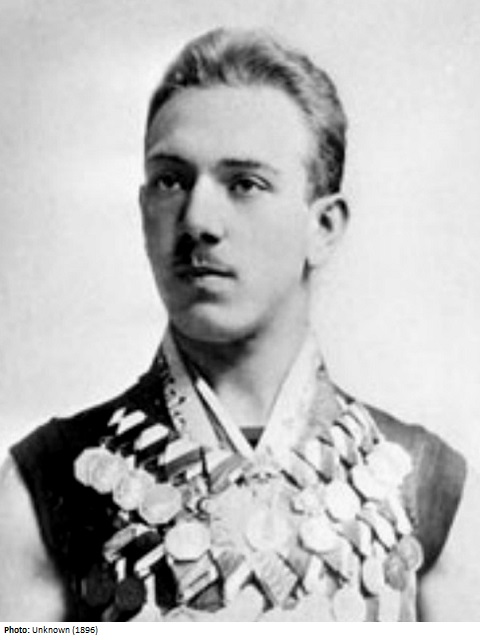Alfréd Hajós

Biographical information
| Roles | Competed in Olympic Games • Non-starter |
|---|---|
| Sex | Male |
| Full name | Alfréd•Hajós |
| Used name | Alfréd•Hajós |
| Nick/petnames | Magyar delfin |
| Other names | Arnold Guttmann |
| Born | 1 February 1878 in Budapest, Budapest (HUN) |
| Died | 12 November 1955 (aged 77 years 9 months 11 days) in Budapest, Budapest (HUN) |
| Affiliations | Budapesti Torna Club/Edison KE |
| NOC |  Hungary Hungary |
| Medals | OG |
| Gold | 2 |
| Silver | 1 |
| Bronze | 0 |
| Total | 3 |
Biography
As a 13-year-old boy, Arnold Guttmann saw his father drown in the Danube, after which he felt the urge to become a good swimmer. With the growing Hungarian nationalism and the impending 1000-year existence of the country, he changed his surname to Hajós (“sailor”). At age 17, he won the European Championships in the 100 m freestyle held in Vienna (1895), and added the Austro-Hungarian title the next day. Hajós was selected for the Hungarian team for the first Olympics in Athens, where he hoped to swim all events. Because of the tight schedule, he could only compete in the 100 and 1200 m freestyle, but won both races. Hajós retained his European title several months later, although not after his compatriot Gräfl had been disqualified. He placed fifth at the 1897 European Championships, after which he gave more attention to other sports. He won a number of Hungarian track and field titles, in events as varied as the discus throw and the hurdles. He also played football, winning the Hungarian title and playing on the national team. He was coach of the Hungarian squad between 1906 and 1908.
Hajós won another Olympic medal in 1924, in the art contests. His design for a stadium, co-designed by former tennis player Dezső Lauber, won a silver medal. In addition to Walter Winans, he became the only Olympian to win a medal in sports and art competitions. Outside of this competition, Hajós designed many sports facilities too. Among the best known are Budapest’s swimming stadium (which hosted the 1958, 2006, and 2010 European Championships), and the Újpest FC stadium.
In 1899 Hajós graduated as an architect at the Technical University of Budapest. Five years later, he opened his own office with his partner János Villányi and became independent after the First World War. From 1948, he was technical advisor to the Design Office for Building Construction and was involved in the reconstruction of large public buildings. His main work is the antique style design from 1924 for the Hungarian stadium for 50,000 spectators, whose realization was prevented by the outbreak and the consequences of World War I. In 1919 it was planned to build the facility on the Margaret Island instead on the originally considered Vérmező army terrain. Finally, the site of a former horse racing track in the XIV. District was envisaged. There, the Nép-Stadium was eventually built after World War II.
In 1928 and 1932, Hajós competed again as an architect in the art competitions. His 14 exhibits from 1928 are probably related to the design of a sports forum, which would include an open and covered swimming pool, a gymnasium, an institute for the training of sports teachers and the physical education authority in addition to the stadium. In 1932, Hajós submitted plans and other exhibits for the swimming pool on Margaret Island planned in 1930. The pool was extended in 1937 and refurbished in 2000. It was the first indoor swimming pool in the world, and the building served as the European standard for a long time. The building is characterized by a bold use of reinforced concrete as well as modern use of space and facades. In 1953, Hajós was awarded the Olympic Diploma of Merit by the IOC.
Results
| Games | Discipline (Sport) / Event | NOC / Team | Pos | Medal | As | |
|---|---|---|---|---|---|---|
| 1896 Summer Olympics | Swimming (Aquatics) |  HUN HUN |
Alfréd Hajós | |||
| 100 metres Freestyle, Men (Olympic) | 1 | Gold | ||||
| 500 metres Freestyle, Men (Olympic) | ||||||
| 1,200 metres Freestyle, Men (Olympic) | 1 | Gold | ||||
| 1906 Intercalated Games | Swimming (Aquatics) |  HUN HUN |
Alfréd Hajós | |||
| 400 metres Freestyle, Men (Intercalated) | ||||||
| 1 mile Freestyle, Men (Intercalated) | ||||||
| 1924 Summer Olympics | Art Competitions |  HUN HUN |
Alfréd Hajós | |||
| Architecture, Open (Olympic) | Dezső Lauber | 2 | Silver | |||
| 1928 Summer Olympics | Art Competitions |  HUN HUN |
Alfréd Hajós | |||
| Architecture, Further Entries, Open (Olympic) | ||||||
| 1932 Summer Olympics | Art Competitions |  HUN HUN |
Alfréd Hajós | |||
| Architecture, Further Entries, Open (Olympic) |
Olympic family relations
- Brother of Henrik Hajós
List mentions
- Listed in Olympians With Asteroids Named After Them (151242 Hajós)